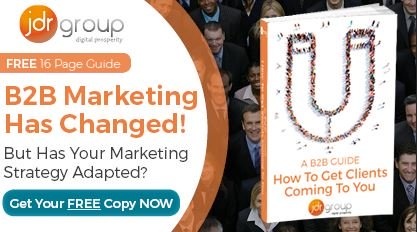How To Market Your Small Business

Knowing where to start with marketing your small business can be tricky, as there is so much information out there it’s hard to know where to start. 
Rather than talking about individual tools and marketing tactics, in this article, we cut to the chase and explain the basic approaches small businesses should take when marketing their business online for the first time. Adhering to these principles lays the foundation for success, on which a sound marketing strategy and personalised marketing plan can be built around your goals.
Start with your customer
A natural place to start for businesses considering sales and marketing is an analysis of their own strengths and the opportunities available to them. Determining your unique selling point (USP) is a core part of this, and many businesses find that a brutally honest SWOT (strengths, weaknesses, opportunities, & threats) analysis provides a useful foundation for sales outreach.
We strongly recommend introspection and analysis to any business that is serious about getting more customers. However, it is a mistake to make this the starting point for your efforts. The starting point for marketing is not your business at all, but your customers. Without a thorough understanding of your target buyers, including what makes them tick, what they like and don’t like, their demographic profile, their objectives at work and the hurdles they face in their role, a marketing campaign won’t succeed. No matter how much you spend and how many marketing tools you use, if your messages and content are not relevant to your target buyers, then you won’t get many sales.
So, here we have the biggest mistake that small businesses make with marketing. How do you avoid this? The answer is to create buyer personas for each of your target buyers.
What are buyer personas?
A buyer persona is a fictitious but representative customer profile, not of the businesses you work with but the people employed by them that you deal with. Most SMEs have between one and four buyer types. These could be, for instance, business owners, factory floor supervisors, HR managers, senior engineers, or finance directors.
Your buyer personas are crib sheets in which you note down all the information you have about each type of person, from their typical gender and age range to their personality type, level of experience, job role, responsibilities, level of authority, and so on. The more information you have, the more representative your buyer persona will be, so feel free to include as much data as you can – including the types of social media platform they use, and what they like to do outside of work. It’s all relevant.
Your buyer personas let you determine the best types of marketing channel to use to get sales, the tone of voice to use in your content, the type of questions that need to be addressed, and even the approach to take to your sales cycle – i.e. can the person make purchase decisions on their own authority?
Streamline your efforts
There are so many potential marketing activities and channels available that no business can possibly engage in them all, and nor should they need to. Once you’ve created accurate buyer personas, you are in a strong position to streamline your efforts and concentrate on what works for your industry. For example, if you are a B2B enterprise you are unlikely to profit much from advertising on Tik-Tok and Instagram. You are better served focusing your social media efforts on LinkedIn and Facebook, and potentially Twitter, too. Likewise, there is no point scheduling your marketing emails for 7 PM if your target buyers are strict 9-to-5 types. And you shouldn’t be using male-specific job terminology (foreman, manpower, man-hours etc) if your target buyers are predominantly female.
Streamlining your marketing efforts means focusing on the activities with the best chance of making you money, by resonating with your target market and creating a compelling case for your products and services. This reduces your cost of sales and lets you achieve more with your marketing budget.
JDR Group – SME B2B marketing specialists
A lot of SME marketing resources are designed for the B2C market, with a heavy emphasis on online retail. These tactics don’t always translate directly into the B2B market. For SMEs offering a B2B product or service, you need a specific strategy that speaks to the needs of your target customers (the businesses themselves), and the human buyers you deal with on a daily basis.
JDR are a digital marketing agency specialising in small business growth, with 17 years’ experience helping businesses like yours reach your target customers and achieve your growth objectives. For more information about how we do this, and how our services could help your business, please give us a call to arrange an informal chat and a free inbound marketing audit.
Image Source: Pexels


